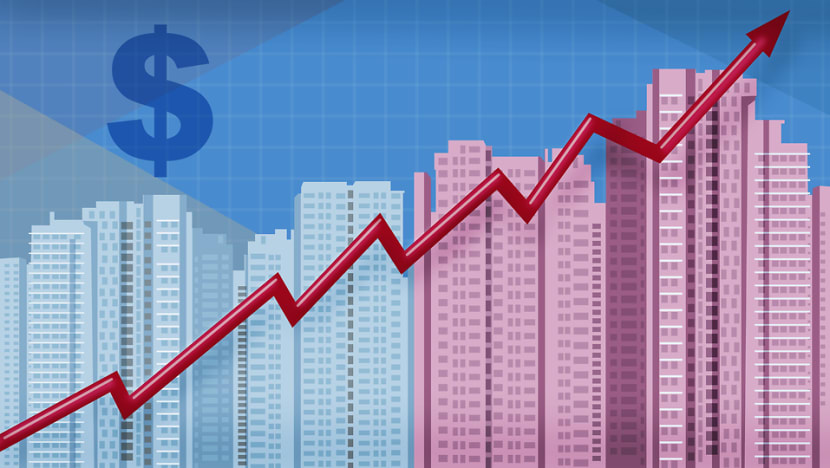IN FOCUS: What is pushing HDB resale prices higher?

Illustration: Rafa Estrada
SINGAPORE: Like many newlyweds, Elizabeth hopes to have a home of her own, where she can start a family with her husband.
However, the process of balloting for a Build-to-Order (BTO) flat, then having to wait at least another three to four years for the flat to be ready would take too long, she said.
“I've seen some cases with my friends who try (applying for a flat) several times and they don't get it, so we don't have that time to go ballot, and possibly have to wait more than five years,” she told CNA.
As such, the 27-year-old marketing associate is now looking for a resale Housing and Development Board (HDB) flat where she can start a family.
She is not alone.
From the COVID-19 outbreak in migrant worker dormitories last year to disruptions in the supply chain for construction materials and restrictions on the entry of foreign labour, the ongoing pandemic has impacted the supply of public housing.
READ: Smaller homes, shorter-lease units: How Singapore's housing landscape might change amid population shifts
In April, the Ministry of National Development warned that about 85 per cent of BTO projects were about six to nine months behind schedule.
These delays have helped sparked greater demand for resale flats among home buyers, said ERA head of research and consultancy Nicholas Mak.
“There's a strong demand for resale flats and the supply of resale is inflexible,” said Mr Mak.
“So as a result, we see demand stronger than supply (and) prices go up.”
LISTEN: Heart of the Matter: Singapore residential property market: Are cooling measures due soon after year of rising prices?
RESALE PRICES ON THE RISE
Resale flat prices have been on the rise, with figures released by real estate portal SRX on Thursday (Jul 8) showing that prices for such flats had risen for 12 straight months as of June this year.
There was a 13.2 per cent year-on-year increase in the prices of resale flats from June last year, the data showed.

SRX’s Singapore Property Index for HDB resale properties - which is used to compare overall price movements of resale flats - shot up from 132.3 in June last year to 149.8 last month. The data is calculated using resale transactions registered across towns, flat types and models.
There was a year-on-year increase in resale prices across all flat types, with three-room units showing the greatest increase at 14.8 per cent.
Four-room units increased by 12 per cent, five-room homes showed an 11.6 per cent increase and executive flats went up 12.3 per cent.
The prices for mature estates increased by 10.9 per cent, while those for non-mature estates shot up 14.9 per cent from a year ago, SRX noted.
USE THE MAP TO FIND OUT HOW MUCH YOU CAN EXPECT TO PAY FOR A RESALE FLAT:
SRX figures showed that there were 30,834 resale flats sold between June 2020 and June this year.
Data released by HDB earlier this year showed there were 24,748 resale units sold in 2020, up from 23,714 in 2019.
According to SRX, there were 106 HDB flats that were sold for more than S$1 million in the first six months of 2021 alone - a threefold increase from the same period last year.
Industry watchers pointed to several other reasons for the rising prices.
“On the demand side, the strong pent up demand in the private housing market also caused some buyers - especially the sandwich group, who could not afford the high prices in private housing - to look for houses in the resale market,” said Professor Sing Tien Foo, director of the Institute of Real Estate and Urban Studies (IREUS) at the National University of Singapore.
Professor Sing also pointed to the “ultra-low” interest rate as another factor that induced more demand in the resale HDB market.
READ: BTO projects expected 'to be delayed' by a year or more due to tightened COVID-19 border measures
“Of note, there is also a bumper crop of flats exiting the five-year Minimum Occupation Period (MOP), where some home owners may sell their flat and look for new homes in the resale market or the private residential market,” said Mr Ismail Gafoor, CEO of real estate firm Propnex.
“Over 25,500 flats are estimated to reach their MOP this year, making them eligible to be sold in the resale market. These ‘younger’ flats, with longer leases and newer condition, also tend to fetch higher resale prices,” he added.
There is likely to be some continuing “upward pressure” on resale prices in the coming quarters, said Mr Ismail.
“For the full year 2021, we are projecting HDB resale prices to grow by 9 per cent to 10 per cent, owing to the sustained demand for HDB resale flats,” he said.
For now, high resale prices are skewed towards more mature, centrally located towns, said Prof Sing, although he noted that the increases could spill over to newer estates such as Punggol and Sengkang.
The median resale price for a four-room flat in Sengkang - where the oldest flats were built in 1997 - is S$472,000.
In Queenstown - which dates back to the 1950s - that figure is S$801,444.
Still, Propnex’s Mr Ismail noted that in non-mature towns, the average resale price had in fact been rising for 10 straight quarters, since the first quarter of 2019.
“A possible reason for the extended period of average resale price increase in non-mature estates could be that as non-mature towns continue to grow and develop in terms of infrastructure, improved connectivity and amenities, the rate of price growth may outpace that of mature towns,” he said.
“In mature towns where flats tend to be costlier, their prices may grow at a slower clip as there could be some resistance to higher asking prices.”
READ: Industry players should not 'stoke exuberant sentiments' in property market: Indranee Rajah
THE ISSUE OF CASH OVER VALUATION
Prof Sing pointed that one of the issues that may affect the affordability of such flats for buyers is that of Cash Over Valuation (COV) prices, noting these would increase given the current resale flat boom.
COV refers to the difference between the transacted price and the unit’s official valuation by the HDB, which buyers must pay fully in cash.
This raised concerns in the 2010s, when some used official valuations as a base price, while negotiating the COV to add on to it.
HDB eventually stopped publishing COV data in 2014 and changed the system such that a flat’s valuation would only be revealed after buyers and sellers had agreed on a transaction price.
However, with resale prices again on the rise, the issue of COV prices is in the spotlight once again.
“COVs still appear in the current hot markets, when more buyers are chasing after limited supply in the resale market,” said Prof Sing.
READ: More HDB resale flat buyers willing to pay prices higher than units' valuation, say property agents
CNA reported in January that some property agents noted that 90 per cent of their resale transactions now entailed COV sums ranging from S$5,000 to S$20,000.
In April, TODAY reported that COV prices of between S$100,000 and S$200,000 were not unheard of, quoting one buyer who had paid a COV sum of about S$160,000 for a 27-year-old five-room HDB flat in Pasir Ris that month.
“COV has the unfortunate effect of accelerating the price growth, because no matter what the valuation is, the COV just pulls up the price further in the next month, in the next quarter,” said ERA’s Mr Mak.
One solution would be to simply ban the paying of COV, he said.
Mr Mak noted, however, that this may not solve the problem as buyers may just end up discreetly paying the amount to sellers to secure the flat that they want, without declaring it to the authorities.
Property analyst Ong Kah Seng said the resurfacing of high COVs could point to stiff competition between buyers trying to outbid one another.
This could result in buyers’ remorse should they realise they “overbid” for a flat, he said, urging buyers to do their due diligence and carefully consider buying a resale flat.
“Rising prices, especially when COV increases, could affect younger couples, if they do not have enough savings to pay for the COV. They may have to either look for houses in other non-mature estates, or apply for new BTO launches,” said Prof Sing.
READ: HDB resale prices up 2.8% in second quarter: Flash estimates
ACTING ‘AGAINST THE INSTINCT OF THE MARKET’
The issue of rising prices for resale flats ultimately boils down to a philosophical issue, said ERA’s Mr Mak, pointing to a need to find a balance between allowing free market principles to operate and the “social engineering” needed to ensure housing remains affordable.
Rising resale prices have not escaped the attention of the authorities.
Speaking during the Committee of Supply debate for his ministry in March this year, Minister for National Development Desmond Lee pointed to the need to keep flats affordable.
For HDB flats in future developments such as the Greater Southern Waterfront, a new housing model would be introduced, he said.
Mr Lee noted the need to ensure that public housing in such areas remains “affordable and inclusive over time”, pointing to the possibility that flats in such areas could end up going for “extremely high prices” on the resale market and end up being exclusively the domain of the more well-off.
“In short, as a social policy, we have to act against the instinct of the market,” he said.
Suggestions such as limiting the pool of resale buyers or imposing a longer minimum occupation period had been raised, he noted then.
READ: Commentary: Keeping public housing in prime locations like Greater Southern Waterfront affordable and fair
NOT NECESSARILY A BAD THING
Mr Ismail suggested that a fall in the resale prices of HDB flats may not necessarily be a positive thing.
“With the majority of Singaporeans owning and living in HDB flats, many households have a huge chunk of their savings tied up in their flat; a sharp decline or persistent fall in HDB resale values could negatively impact household wealth and retirement adequacy,” he said.
Public housing remains the most affordable option here, he said, adding that the recent uptick in HDB resale prices is “not necessarily a bad thing”, coming after six years of price declines.
“Home prices are closely tied to consumer confidence, income and economic growth. With more positive growth prospects and rising income over the years, people have been able to spend more on homes, generating demand for properties and thereby propping up prices,” said Mr Ismail.
“The key is to ensure that current prices are realistic to current income levels and remain affordable for the mass market. With the current grants and subsidies in place, we believe that the public housing market is still affordable to a broad section of the population.”
As for Elizabeth, although she cited cost as a consideration in choosing the right flat, the marketing associate said she is not willing to wait for prices to come down.
The enduring high demand for resale flats means fierce competition with others, she noted.
“I think if we see a unit now that we really, really like - then I think there is also a chance that someone else might want that unit as well,” she said.













